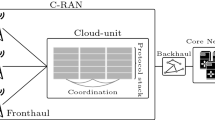Abstract
In this paper, we study the Reporting Cells scheme, a popular strategy used to control the movement of mobile terminals in the Public Land Mobile Networks. In contrast to previously published works, we propose a multiobjective approach that allows us to avoid the drawbacks of the linear aggregation of the objective functions. Furthermore, we provide a novel formulation to take into account aspects of the Reporting Cells that have not been considered in previous works. Experimental results show that our proposal outperforms other optimization techniques published in the literature.
Access this chapter
Tax calculation will be finalised at checkout
Purchases are for personal use only
Preview
Unable to display preview. Download preview PDF.
Similar content being viewed by others
References
Nowoswiat, D., Milliken, G.: Managing LTE core network signaling traffic. Alcatel-Lucent, Techzine (2013)
Kyamakya, K., Jobmann, K.: Location management in cellular networks: classification of the most important paradigms, realistic simulation framework, and relative performance analysis. IEEE Transactions on Vehicular Technology 54(2), 687–708 (2005)
Bar-Noy, A., Kessler, I.: Tracking mobile users in wireless communications networks. IEEE Transactions on Information Theory 39(6), 1877–1886 (1993)
Hac, A., Zhou, X.: Locating strategies for Personal Communication Networks: A novel tracking strategy. IEEE Journal on Selected Areas in Communications 15(8), 1425–1436 (1997)
Subrata, R., Zomaya, A.Y.: A comparison of three artificial life techniques for Reporting Cell planning in mobile computing. IEEE Trans. Parallel Distrib. Syst. 14(2), 142–153 (2003)
Alba, E., García-Nieto, J., Taheri, J., Zomaya, A.Y.: New research in nature inspired algorithms for mobility management in GSM networks. In: Giacobini, M., Brabazon, A., Cagnoni, S., Di Caro, G.A., Drechsler, R., Ekárt, A., Esparcia-Alcázar, A.I., Farooq, M., Fink, A., McCormack, J., O’Neill, M., Romero, J., Rothlauf, F., Squillero, G., Uyar, A.Ş., Yang, S. (eds.) EvoWorkshops 2008. LNCS, vol. 4974, pp. 1–10. Springer, Heidelberg (2008)
Almeida-Luz, S.M., Vega-Rodríguez, M.A., Gómez-Pulido, J.A., Sánchez-Pérez, J.M.: Applying differential evolution to the Reporting Cells problem. In: International Multiconference on Computer Science and Information Technology, pp. 65–71 (2008)
Almeida-Luz, S.M., Vega-Rodríguez, M.A., Gómez-Pulido, J.A., Sánchez-Pérez, J.M.: Solving the reporting cells problem using a scatter search based algorithm. In: Szczuka, M., Kryszkiewicz, M., Ramanna, S., Jensen, R., Hu, Q. (eds.) RSCTC 2010. LNCS, vol. 6086, pp. 534–543. Springer, Heidelberg (2010)
Deb, K., Pratap, A., Agarwal, S., Meyarivan, T.: A fast and elitist multiobjective genetic algorithm: NSGA-II. IEEE Transactions on Evolutionary Computation 6(2), 182–197 (2002)
Coello, C.A.C., Lamont, G.B., Veldhuizen, D.A.V.: Evolutionary Algorithms for Solving Multi-Objective Problems (Genetic and Evolutionary Computation). Springer-Verlag New York, Inc., Secaucus (2006)
Taheri, J., Zomaya, A.Y.: A simulation tool for mobility management experiments. Int. J. Pervasive Computing and Communications 5(3), 360–379 (2009)
Corchado, E., Wozniak, M., Abraham, A., de Carvalho, A.C.P.L.F., Snásel, V.: Recent trends in intelligent data analysis. Neurocomputing 126, 1–2 (2014)
Author information
Authors and Affiliations
Editor information
Editors and Affiliations
Rights and permissions
Copyright information
© 2014 Springer International Publishing Switzerland
About this paper
Cite this paper
Berrocal-Plaza, V., Vega-Rodríguez, M.A., Sánchez-Pérez, J.M. (2014). Non-dominated Sorting and a Novel Formulation in the Reporting Cells Planning. In: Polycarpou, M., de Carvalho, A.C.P.L.F., Pan, JS., Woźniak, M., Quintian, H., Corchado, E. (eds) Hybrid Artificial Intelligence Systems. HAIS 2014. Lecture Notes in Computer Science(), vol 8480. Springer, Cham. https://doi.org/10.1007/978-3-319-07617-1_26
Download citation
DOI: https://doi.org/10.1007/978-3-319-07617-1_26
Publisher Name: Springer, Cham
Print ISBN: 978-3-319-07616-4
Online ISBN: 978-3-319-07617-1
eBook Packages: Computer ScienceComputer Science (R0)




